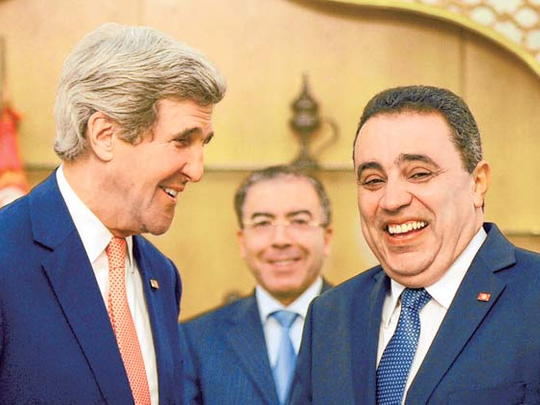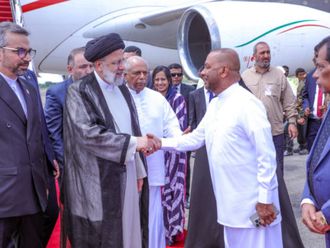
Tunis, Tunisia: US Secretary of State John Kerry on Tuesday congratulated Tunisia on its new post-revolutionary constitution and promised American assistance in the North African nation’s battle against terrorists.
The United States wants to encourage the democratic transition in Tunisia, which ousted its longtime dictator in January 2011 and sparked wider revolts that toppled leaders in Egypt, Libya and Yemen.
After two years of fractious debate, Tunisia’s elected assembly of Islamists, leftists and liberals approved what has been described as one of the most progressive constitutions in the region, but now the government is battling Islamist militants.
“No democracy can survive or prosper without security,” Kerry said in a press conference at the US embassy during his unannounced stop in Tunisia. He also announced that the United States would give Tunisia a high-tech mobile command post vehicle for conducting terrorism investigations, and a mobile crime lab for police forensics investigations.
Tunisians have requested material and financial aid in their fight against militant groups. In recent weeks several people have been killed or wounded a string of shoot-outs between security forces and a faction called Ansar Al Shariah.
Of the $400 million (Dh1.46 billion) in US assistance since the revolution, $24 million has been used to equip and train Tunisian security forces. Kerry expressed his confidence in Tunisia’s ability to fight terrorism and applauded the recent operations.
“The evidence of that are the very significant arrests that were made and the break-up of Ansar Al Shariah’s cells in the last weeks,” Kerry said, describing the security operations as “well carried out, well planned and well executed.”
Kerry stopped in Tunis en route from Abu Dhabi to Paris, where on Wednesday he is scheduled to meet Palestinian President Mahmoud Abbas.
Tunisia’s new charter — achieved after two years of laborious, often turbulent negotiations — has been hailed as one of the most progressive constitutions in the Arab world. A compromise between liberals and Islamists, it guarantees freedom of religion and women’s rights.
“It is a constitution that underscores Tunisia’s long tradition of respect for the rights of women and minorities,” said Kerry, evoking the memory of the itinerant fruit seller whose self-immolation in December 2010 kicked off the uprising. “It is a constitution that will allow the people to realise the aspirations of Mohammad Bu Azizi and millions of others, and it is constitution that can serve as a model for others in the region and around the world.”
Although the process was messy and marked by high unemployment, protests, terrorist attacks, assassinations and repeated walkouts by negotiators, Tunisia is cautiously seen as a success story, especially compared to Egypt.
During the period that the Tunisians drafted their constitution, Egypt wrote two constitutions and suffered a military coup against an elected government. Egypt’s charters were quickly drafted by appointed committees with little public debate. In Tunisia, an elected assembly of Tunisian Islamists, leftists and liberals worked together on the text.
Tunisia’s constitution aims to make the country of 11 million people a democracy, with a civil state whose laws are not based on Islamic law, unlike many other Arab constitutions. An entire chapter of the document, some 28 articles, is dedicated to protecting citizens’ rights, including protection from torture, the right to due process and freedom of worship. It also guarantees legal equality between men and women.
After overthrowing their dictator in 2011, Tunisians brought a moderate Islamist party into power allied with two secular parties. The coalition struggled with continuing social unrest, high unemployment, the rise of a radical Islamist movement with ties to Al Qaida, and the assassination of two left-wing politicians.
Inflation soared, the budget deficit swelled, and demonstrations over high food prices and unemployment spread. However since the constitution’s approval, Tunisia’s image abroad has brightened, the slide of the Tunisian dinar has halted, and the stock market has perked up.












